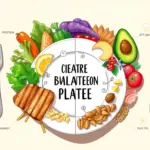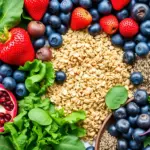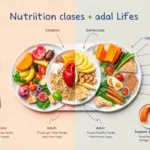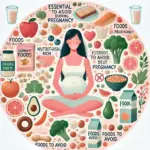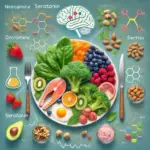Cooking is more than just preparing meals; it plays a significant role in mental health and well-being. Engaging in cooking not only nourishes the body but also offers therapeutic benefits that can boost mood and foster creativity. In this article, we will explore how cooking serves as a mindful practice, enhances self-esteem through tangible accomplishments, and provides an outlet for artistic expression. Additionally, we’ll look at the social connections formed through shared cooking experiences and the nutritional impact of home-cooked meals on mental health. Discover the various ways that cooking can enrich your life and support your overall well-being.
Therapeutic Benefits of Cooking
Mindfulness Through Cooking:
Cooking can serve as an effective form of mindfulness practice. Engaging fully in the cooking process allows individuals to be present in the moment, focusing on the sights, smells, and sounds of food preparation. This immersion can reduce stress and promote a sense of calm, as it diverts attention from daily worries.
Benefits of practicing mindfulness in cooking include decreased anxiety and enhanced well-being. By concentrating on the textures of ingredients and the techniques involved in creating a dish, one can cultivate a peaceful mind and a more profound sense of fulfillment.
Sense of Accomplishment:
One of the most rewarding aspects of cooking is the satisfaction derived from creating a meal. Successfully preparing a dish can significantly boost self-esteem and provide a sense of accomplishment.
Tasks such as chopping vegetables, following a recipe, or baking can deliver tangible evidence of one’s skills and efforts. Evidence suggests that completing cooking tasks contributes to a positive self-image, motivating individuals to take on new challenges in their daily lives.
Cooking as a Creative Outlet
Expression Through Culinary Arts:
Cooking is much more than just a necessity; it’s a vibrant form of self-expression. Through the selection of ingredients, cooking techniques, and presentation, individuals can create dishes that reflect their personal identity and taste preferences. For example, someone who loves spicy flavors might experiment with various peppers and spices to create a unique dish that tells a story about their culinary influences. This creative process not only allows for personal expression but also invites exploration of cultural heritage through food.
Exploring New Recipes:
Encouraging experimentation in the kitchen can foster creativity and stimulate the mind. Trying new recipes or diving into unfamiliar cuisines can expand one’s culinary repertoire and challenge conventional cooking methods. This not only keeps the cooking experience fresh and exciting but can also alleviate boredom associated with repetitive meals. The act of researching different techniques or ingredients can enhance cognitive engagement, making every meal an opportunity for discovery and personal growth. By stepping out of comfort zones and embracing new dishes, individuals can gain confidence and derive joy from their culinary adventures.

Cooking as a Creative Outlet
Expression Through Culinary Arts
Cooking serves as a powerful form of self-expression, allowing individuals to creatively showcase their culinary skills and personal tastes. Whether it’s a traditional family recipe or an innovative dish inspired by global cuisines, the kitchen becomes a canvas for individual creativity. By selecting ingredients that resonate with their personal identity, individuals can create unique meals that reflect their cultural background and personal preferences. For example, someone passionate about Italian cuisine may find joy in crafting homemade pasta, while a fan of spicy dishes might experiment with flavors from the Caribbean. This personal touch not only enhances the cooking experience but also fosters a deeper connection to the food being prepared.
Exploring New Recipes
Experimentation in the kitchen encourages creativity and mental stimulation. Trying new recipes or exploring unfamiliar cuisines not only broadens culinary skills but also stimulates the mind. Engaging with different cooking techniques or ingredients fosters a sense of adventure. For instance, attempting to recreate a complicated dish from a favorite restaurant or experimenting with a fusion recipe can be both challenging and rewarding. This process of exploration can invigorate one’s cooking routine, leading to increased curiosity and enjoyment in the kitchen. Cooking can transform into a delightful journey of discovery, promoting mental engagement and creativity along the way.
Nutrition and Mental Health
Impact of Diet on Mood
The relationship between nutrition and mental well-being is increasingly recognized by researchers and health professionals. Studies indicate that a balanced diet rich in nutrients plays a crucial role in regulating mood and emotional stability. Key nutrients that support brain health include:
- Omega-3 Fatty Acids: Found in fatty fish, walnuts, and flaxseeds, these fats are linked to reduced symptoms of depression and anxiety.
- Antioxidants: Present in fruits, vegetables, and whole grains, antioxidants can help lower inflammation and oxidative stress, improving overall mental health.
- B Vitamins: Essential for brain function, B vitamins, especially B6, B12, and folate, are important in the production of neurotransmitters that affect mood.
Incorporating these nutrients into your cooking can be an easy and delicious way to enhance your mental well-being.
Cooking Healthy Meals
Preparing nutritious meals at home can significantly impact your mood and energy levels. Here are some tips for cooking healthy meals:
- Plan Your Meals: Create a weekly meal plan focusing on incorporating various food groups, like lean proteins, whole grains, and plenty of fruits and vegetables.
- Cook in Batches: Prepare large portions of healthy meals to store for later, helping you avoid the temptation of quick but unhealthy options.
- Experiment with Ingredients: Substitute unhealthy ingredients with healthier options, such as using Greek yogurt instead of sour cream or whole grain pasta instead of white pasta.
Emphasizing home-cooked meals rather than relying on processed foods can improve not only your physical health but also your mental clarity and emotional resilience.
Stress Relief and Relaxation
Cooking as a Form of Stress Relief
Cooking can serve as a therapeutic escape from daily stressors. Engaging in the rhythmic process of chopping, stirring, and simmering allows individuals to focus on the task at hand, providing a mental break from worries. By immersing oneself in cooking, it’s possible to cultivate a sense of calm and mindfulness.
- Tips for a Stress-Free Cooking Environment:
- Create a Relaxing Atmosphere: Play soft music or light candles to enhance the cooking experience.
- Organize Your Space: Keep your kitchen tidy and have all ingredients ready to minimize frustration.
- Set Realistic Goals: Choose simple recipes that can be accomplished without pressure.
Rituals and Routine in Cooking
Establishing a cooking routine can lead to calming effects on the mind. When cooking becomes a regular activity, it might serve as a meditative practice that promotes relaxation. Ritualistic cooking practices, whether it’s baking on the weekends or preparing special family meals, can create stability.
- Examples of Ritualistic Cooking Practices:
- Making Monday night dinner a family affair.
- Preparing a weekly batch of soup to enjoy throughout the week.
- Engaging in seasonal cooking, like holiday baking festivals.
By turning cooking into a cherished routine, individuals can nurture their mental well-being while enjoying the process of preparing food.
Cooking and Cognitive Function
Enhancing Memory and Focus:
Cooking involves planning meals and following recipes, which engage various cognitive processes. Research shows that these activities can enhance memory retention and improve focus. Multitasking—like chopping vegetables while monitoring boiling water—stimulates the brain, helping to develop attention and executive function skills.
Lifelong Learning in the Kitchen:
Cooking is a dynamic activity that encourages continuous learning and skill development. From mastering new techniques to understanding food culture and history, the kitchen offers endless opportunities for growth. Engaging with diverse cuisines can broaden knowledge and enhance cognitive challenges, making it both a fulfilling and stimulating experience.
Overcoming Kitchen Anxiety
Strategies to Build Confidence in Cooking:
Cooking can be an intimidating task for many, leading to anxiety in the kitchen. Here are some tips to build confidence:
- Start Simple: Begin with easy recipes that require minimal ingredients and steps. This helps to build foundational skills and gradually introduces more complex dishes.
- Practice Regularly: The more you cook, the more comfortable you’ll become. Set aside time each week to practice different cooking techniques.
- Learn from Mistakes: Understand that errors are part of the process. Instead of feeling discouraged, view mistakes as opportunities to learn and improve.
Seeking Help and Resources:
There are numerous resources available to ease cooking anxiety:
- Online Tutorials: Websites like YouTube offer a plethora of cooking videos that guide you step by step. This visual aid can be particularly helpful for novice cooks.
- Cooking Books: Beginner-friendly cookbooks often provide clear, straightforward instructions that make the cooking process less daunting.
- Community Support: Engage with local cooking classes or online cooking forums where you can ask questions, share experiences, and gain encouragement from others.
By leveraging these strategies and resources, individuals can overcome their kitchen anxiety and embrace the therapeutic benefits of cooking.
Conclusion
In this article, we explored the multifaceted role of cooking in promoting mental health and well-being. From the therapeutic benefits of mindfulness and a sense of accomplishment to cooking as a creative outlet, we highlighted how engaging with food can enhance self-expression and personal identity. Additionally, we discussed the importance of social connections fostered through shared cooking experiences and community engagement, as well as the impact of nutrition on mood and cognitive function.
By embracing cooking as a stress-relieving activity and establishing rituals in the kitchen, you can find solace and relaxation amid daily challenges. For those who struggle with kitchen anxiety, various strategies and resources can help build confidence and support continuous growth.
We encourage you to explore cooking as a means of enhancing your mental health, fostering social connections, and expressing creativity. Share your cooking experiences with us in the comments below, and check out our other articles on related topics. For continuous updates, consider subscribing to our newsletter. We hope this article has been beneficial to you in recognizing the positive impacts of cooking on mental health and well-being!



